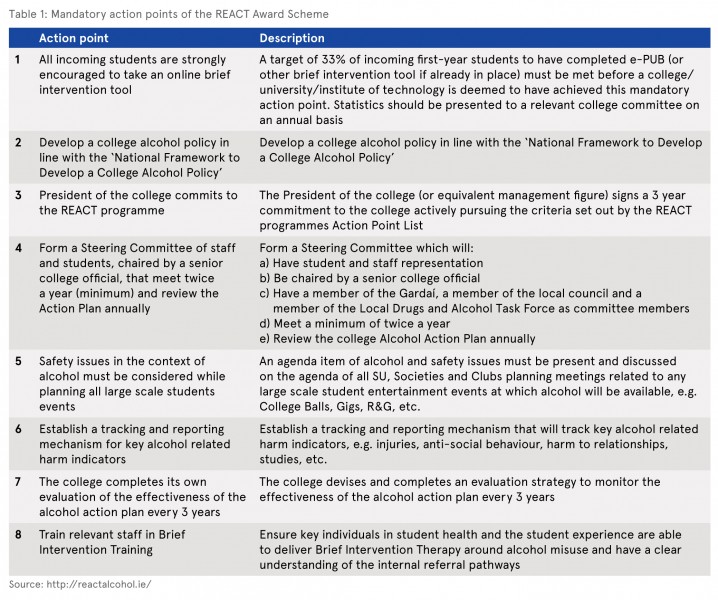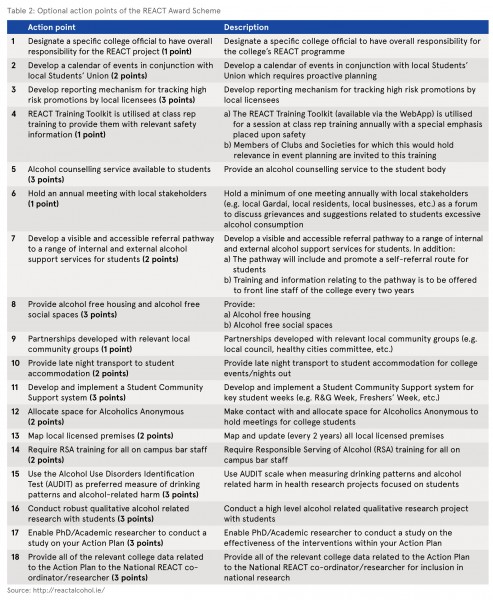Dillon, Lucy (2018) Responding to excessive alcohol consumption in third-level (REACT): a study protocol. Drugnet Ireland, Issue 67, Autumn 2018, pp. 24-26.
| Preview | Title | Contact |
|---|---|---|
|
PDF (Drugnet 67)
730kB |
High levels of alcohol use have been found among third-level students in Ireland. In 2014, the Health Service Executive (HSE) commissioned a research team to develop a public health intervention to address alcohol use among third-level students. Responding to Excessive Alcohol Consumption in Third-level (REACT)1 was developed in collaboration between the Health Matters team at University College Cork, the Irish Student Health Association, and the Union of Students in Ireland (USI).
REACT is currently being implemented in 15 higher education institutions across Ireland (personal communication, REACT project, June 2018). The aim of the programme is to ‘strategically tackle harms associated with alcohol consumption among third-level students’. Evaluation of this programme is currently underway; therefore, evaluation findings from the programme are not yet available. However, a paper has been published outlining the study protocol for developing, implementing, and evaluating the programme.2
The REACT programme
REACT is defined as a multicomponent intervention. It is described by the paper’s authors as forming part of the wider Health Promoting University ethos endorsed by the World Health Organization.3 The concept of the Health Promoting University ‘means much more than health education for students and staff – it means integrating health into the culture, processes and policies of the university’ (p. 5). A defining feature of the programme is that it is an environmental rather than an educational initiative.
Development of the programme was based on a three-step process involving a review of international best practice, a knowledge exchange forum, and expert consultation. The programme ‘seeks to establish a specially tailored accreditation and award system for third-level institutions (colleges/universities/institutes of technology) that make significant changes within their campuses to tackle the growing issue of excessive alcohol consumption among students’ (p. 2).2
Participating third-level institutions are required to carry out activities from a suite of mandatory and optional action points. Lists of these are provided below (see Tables 1 and 2). The participating institution must complete all eight of the action points in Table 1 as well as 16 points from the actions in Table 2, including at least two action points of a ‘three point’ ranking. Institutions can then apply to the REACT team for their award. Once the application is received, an evaluator will be appointed to meet with the institution’s steering committee to discuss the implementation and associated accreditation/award. The details of the content of the accreditation/award were under development at the time of writing.
Implementation and evaluation
REACT will be implemented and evaluated in line with the UK Medical Research Council’s framework guidelines, which aim to help researchers and research funders to recognise and adopt appropriate methods for working on complex interventions (those containing several interacting components). The framework identifies several phases involved in the process of developing and evaluating a complex intervention, although these phases may not necessarily follow a linear sequence: developing an intervention, piloting and feasibility, evaluating the intervention, and implementation.
The REACT evaluation will consist of a number of elements. To begin with, a baseline and follow-up cross-sectional study will be conducted to determine any potential impact of the REACT programme. This study will examine alcohol consumption levels and other related behaviours as well as attitudes among students. It will incorporate the AUDIT (Alcohol Use Disorders Identification Test) and other questions based on a review of national and international research.
The baseline study was conducted at the end of 2016 (n=1873), and the follow-up study is due to be repeated in the same institutions in the autumn of 2018.
Alongside the impact evaluation, a qualitative study will be conducted to explore perceived factors influencing the take-up and implementation of the programme. Research examining students’ views on the programme and on alcohol more generally will be carried out in a separate study.
The authors highlight that the REACT programme ‘provides a structure to translate policy into practice and to tackle hazardous alcohol consumption and related harms among third-level students’ (p. 7). The 15 institutions currently signed up to the programme are in the process of implementing the mandatory and optional action points. The REACT team are working on developing the accreditation framework for the programme and aim to have their first accreditation by 2019.1


1 For further information on the programme (website no longer working)
2 Davoren MP, Calnan S, Mulcahy J, Lynch E, Perry IJ and Byrne M (2018) Responding to excessive alcohol consumption in third-level (REACT): a study protocol. BMC Health Services Research, 18(1): 364. https://www.drugsandalcohol.ie/29015/
3 Tsouros AD, Dowding G, Thompson J and Dooris M (eds) (1998) Health promoting universities: concept, experience and framework for action. p. 174. Copenhagen: World Health Organization Regional Office for Europe. https://www.drugsandalcohol.ie/29173/
B Substances > Alcohol
J Health care, prevention, harm reduction and treatment > Harm reduction > Substance use harm reduction
N Communication, information and education > Educational environment / institution (school / college / university)
N Communication, information and education > Educational environment / institution (school / college / university) > Student behaviour
T Demographic characteristics > Undergraduate or graduate college student
VA Geographic area > Europe > Ireland
Repository Staff Only: item control page